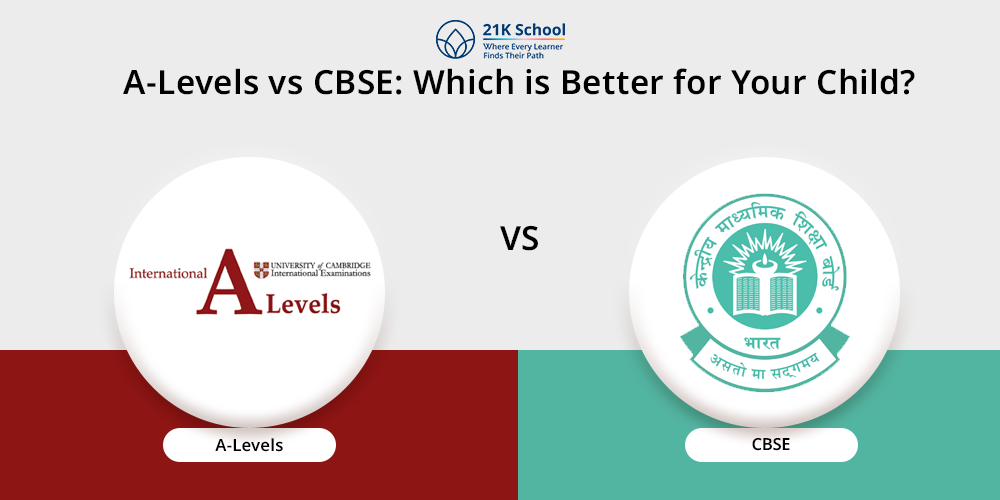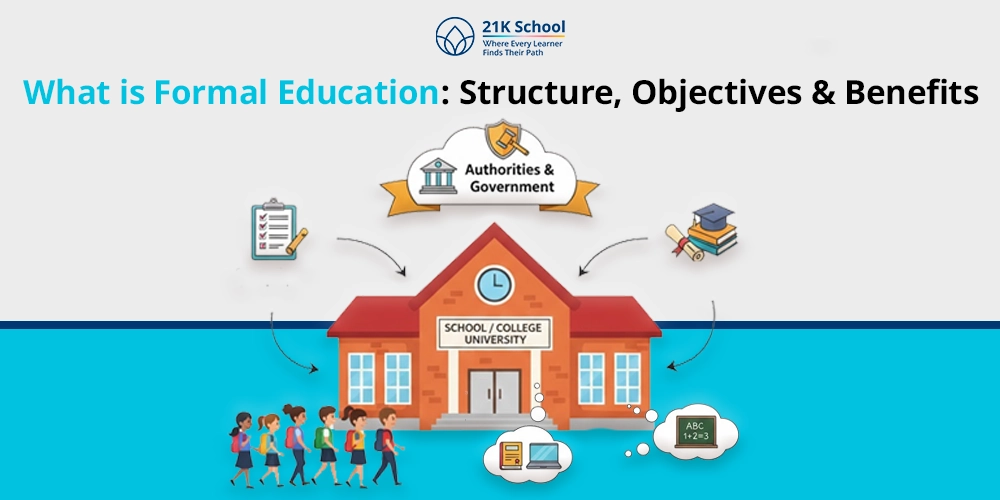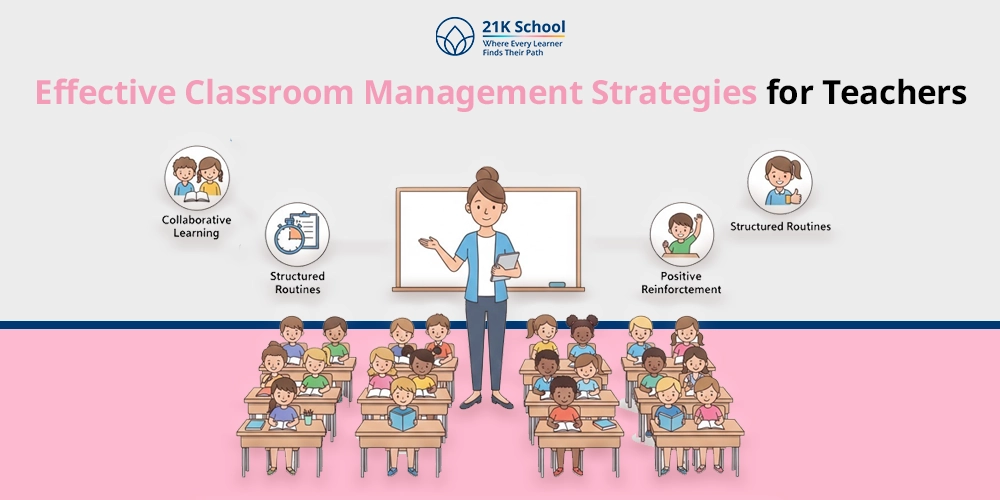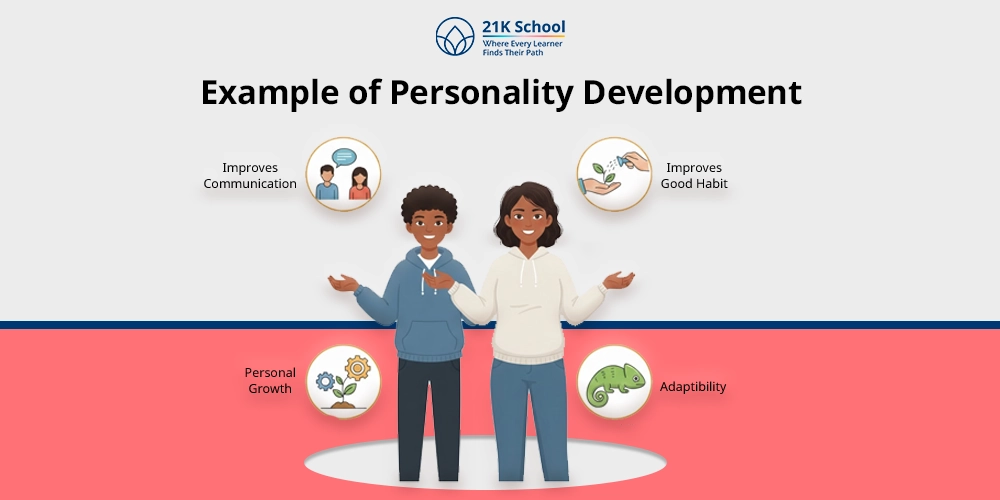
One of the most important decisions every parent takes for their children is selection of the right education board.
In the 21st century, education has evolved and so have requirements. The competitive world needs perfection and analysed steps based on future planning.
And selection between A-Levels vs CBSE, which is better for your child can be a questionable topic especially for young kids.
Both A-Levels vs CBSE have different advantages, disadvantages, features and differences which make them unique and help parents and learners to choose the ideal option.
Here, we will help you by showcasing a detailed comparison between A-Levels vs CBSE so you can make an informed decision for child future growth.
Table of Contents
- What are A-Levels?
- What is CBSE?
- Key Differences Between A-Levels vs CBSE
- 1. Curriculum & Syllabus Depth vs Breadth
- 2. Subject Choices / Electives
- 3. Assessment & Examination Pattern
- 4. Study Material Resources
- 5. Grading System & Result Reporting
- 6. Teaching Methodology & Learning Style
- 7. University Recognition in India
- 8. Global University Recognition
- 9. Flexibility & Scheduling
- 10. Career and Higher Education Pathways
- 11. Cost Factor
- 12. Best For Students
- Conclusion
What are A-Levels?
A-Levels commonly known as Advanced Level is a subject based qualification offered by the UK Education System.
The qualification is about 2 years in which students between 16 to 18 years enroll. It is a popular qualification recognised by many Universities worldwide.
Students who choose A-Levels are open to choose a wide range of subjects which help them to score high in academics and pursue desired career in future.
To know more, understand A-Levels and how they work.
What is CBSE?
CBSE also known as Central Board of Secondary Education is a national and internationally recognised governed by the Ministry of Education.
The board in India offers structured learning and exams for students which help them to take admission in recognised universities for further education.
Key Differences Between A-Levels vs CBSE
Given below is a quick table for you to understand the key difference between A-Levels vs CBSE under different aspects:
| S.No. | Aspects | A-Levels | CBSE |
| 1. | Curriculum & Syllabus Depth vs Breadth | Depth-focused, specialised | Broad, general, stream-based |
| 2. | Subject Choices / Electives | 3 to 4 chosen freely | Fixed streams (Science, Commerce, Arts) |
| 3. | Assessment & Examination Pattern | Final exams + some coursework | Year-end board exams (theory + practicals) |
| 4. | Study Material Resources | Syllabus guidelines, past papers, and multiple reference books | NCERT textbooks |
| 5. | Grading System & Result Reporting | Letter grades (A* to E) | Percentage & CGPA |
| 6. | Teaching Methodology & Learning Style | Inquiry-based, critical thinking | Structured, syllabus-driven |
| 7. | University Recognition in India | Limited (mostly private & select universities) | Accepted by all Indian universities |
| 8. | Global University Recognition | Very high | Moderate (with equivalence certificates) |
| 9. | Flexibility & Scheduling | High, students customize subjects | Low, stream-based restrictions |
| 10. | Career and Higher Education Pathways | Ideal for specialised careers abroad (STEM, humanities, law, medicine, etc.) | Ideal for competitive exams like JEE, NEET, UPSC, or CA |
| 11. | Cost Factor | High (international schools/exam fees) | Affordable (government & private schools) |
| 12. | Best For Students | Students aiming for global universities | Students targeting Indian universities |
Learn about difference between IGCSE and a-level.
1. Curriculum & Syllabus Depth vs Breadth
A-Levels: The board mainly focuses on in-depth knowledge of different subjects to pursue desired career growth in future. Explore a-level curriculum.
CBSE: CBSE consists of a broad range of subjects but common streams available for students.
2. Subject Choices / Electives
A-Levels: In A-Levels learners can choose their own favourite subject and any combination. For example, physics with economics and history.
CBSE: CBSE is all about structured learning with specific subjects in each stream. For example, science includes Physics, Chemistry, Biology, English and one optional subject.
3. Assessment & Examination Pattern
A-Levels: Assessments are mostly based on application and analysis which are ideal to test critical thinking skills and problem solving skills.
CBSE: CBSE rely on examinations which are held at year end including both theory and practical.
4. Study Material Resources
A-Levels: There is no particular textbook for a level education. The study is mainly based on syllabus, past question papers, book references based on syllabus etc.
CBSE: The board of a structure learning with standardised NCERT textbooks help to learn effectively.
5. Grading System & Result Reporting
A-Levels: Grading System in A-Level is defined between A* to E. The results are often accompanied by a percentage uniform mark (UMS).
Read on to learn about a-level results day.
CBSE: In CBSE, grades (A1 to E) or CGPA are used in schools. Result shared in total percentage across subjects.
6. Teaching Methodology & Learning Style
A-Levels: A-Levels helps students to learn independently, participating in debates and discussions, and using inquiry-based learning approaches.
CBSE: CBSE board works on structured paced and teacher-led learning approach objective to gain maximum marks in exams. Sometimes schools also implement activity-based learning.
7. University Recognition in India
A-Levels: A-Levels are considered at various private universities in India. However, for government universities students need equivalence certificates from AIU (Association of Indian Universities).
CBSE: CBSE is openly accepted in all Indian Universities and one of the ideal choices for students.
8. Global University Recognition
A-Levels: A-Levels, an highly recognised and standard opportunity where universities from all over the world provide direct entry for UG courses.
CBSE: CBSE is also recognised globally but not equivalent to A-Levels.
9. Flexibility & Scheduling
A-Levels: In A-Levels exams are scheduled between May/June or Oct/Nov sessions and offer flexibility in retakes.
CBSE: In CBSE, March and April are strictly considered for exams only.
10. Career and Higher Education Pathways
A-Levels: It is an ideal opportunity for those who want to pursue specialised careers abroad.
CBSE: It is ideal for students who are looking forward to giving competitive exams for example, JEE, NEET, UPSC etc.
11. Cost Factor
A-Levels: As compared to CBSE the cost of A-Levels is high. It depends on factors like international school fees, exam registration fees, and study material expenses.
CBSE: CBSE is an affordable board for students where learners get required education.
12. Best For Students
A-Levels: Students who are looking forward to education abroad, subject flexibility, and more practical learning.
CBSE: Students who are looking forward to studying in India, affordable opportunities, prepare for competitive exams and seeking traditional learning.
Also, explore the role of special educators in CBSE school for special needs students.
Conclusion
Hope the detailed information about comparison between CBSE vs A-Levels in the above mentioned blog helped you out to choose the right one.
Both CBSE and A-Levels offer immense benefits to nurture students’ lives by providing various features.
A-Levels ensure global exposure, specialised and flexible learning. However, the benefits of the Central Board of Secondary Education are reliable for competitive exams and structured learning.
If you are a parent then it’s time to make the right decision for your child’s long-term goals.
Understand about a-level past papers.



